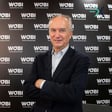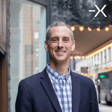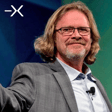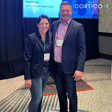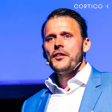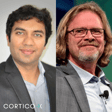Become a Creator today!Start creating today - Share your story with the world!
Start for free
00:00:00
00:00:01

Humanity@Scale, with Bruce Temkin and Sujay Saha
Over the previous decades, technology has made it easier to understand and connect with other people, whether through social media, digital adoption, or with the increasing use of AI. At the same time, human interactions have become more polarized, with growing levels of political and social conflict.
We are at a critical juncture in world history. The combination of technology and interconnectivity can either be used to coerce and further polarize people, or it can be used to enhance human flourishing. How can we push the world in the latter direction? To answer that question, Will is joined by CX legend Bruce Temkin, and the President of Cortico-X, Sujay Saha.
Get in touch with Cortico-X here.
Follow Cortico-X on LinkedIn here.
Transcript
Introduction to Cordico X and Podcast
00:00:00
Speaker
Cordico X is an experience-led transformation business that partners with clients and technology companies to drive digital acceleration. We are experience activists, passionate about elevating everyday human experiences through the belief that what's best for people is what's best for an organization. Reach out to us for a chat. A link is in the show notes.
00:00:34
Speaker
Hello and welcome to Speaking from Experience from CordicoX, where we speak to the people with experience of experience.
Technology: Polarization or Flourishing?
00:00:42
Speaker
I'm Will Kingston. Over the previous decades, technology has made it easier to understand and connect with other people, whether through social media, digital adoption, or with increasing use of AI. At the same time, human interactions have become more polarized, with growing levels of political and social conflict.
00:01:01
Speaker
We are at a critical juncture in world history. The combination of technology and interconnectivity can either be used to coerce and further polarise people, or it can be used to enhance human flourishing. How can we push the world in the latter direction?
Meet the Guests: Bruce Temkin and Sujay Saha
00:01:17
Speaker
To answer that question, I am thrilled to be joined by CX legend Bruce Temkin, whose wise words I just shamelessly plagiarised, and the president of CordocoX, Tsujaysaha,
00:01:29
Speaker
Bruce, Sujay, welcome to Speaking from Experience. Bruce, given that I have stolen your IP, I will start with you. Those words that I just nicked, they were from an article that you wrote earlier in the year titled, My Next Chapter, Humanity at Scale.
Humanity at Scale with Bruce Temkin
00:01:45
Speaker
What is humanity at scale?
00:01:47
Speaker
Well, first of all, there's no plagiarizing if I offer my words for use for anyone at any time for anything that's going to help the cause. And humanity scale is a cause. It's a movement to encourage leaders to make decisions that ultimately improve humanity.
Experience Activism with Sujay Saha
00:02:05
Speaker
So I've heard you speak about a separate but related concept and that is experience activism. When you speak about experience activism, what do you mean by that? And how does that play into the humanity at scale story? I have been going with this concept called a right to experience. This concept or idea came to my mind a few years back while working with different clients across industries. I saw the continuous battle.
00:02:33
Speaker
around building business cases to kind of please the boardroom and help them in understanding and appreciating how there is an ah ROI in resting into experience to the point where we know that everybody in the boardroom understands and appreciates how all of that connects back to real financial value, but they still want to see it on a piece of paper. That made me start to think about like, hey, how much of wasted energy in an organization, thinking about making that case for change. Why not use parallels in the industry, the molecular climate change, sustainability? Why not use some of those movements and concepts and try to bring that to experience?
00:03:23
Speaker
where we really make experience of humans, what Bruce says, humanity at scale. I think Right to Experience is a different version. We kind of talk about how do we create a North Star, which is relatable by the consumers of these organizations and for organizations to really connect emotionally so, not just financially, emotionally so, to ultimately, why do they exist?
Organizations as Experience Factories
00:03:52
Speaker
So if they really exist for the cause of these people who are in their ecosystem, call it consumers, call it employees, call it people all around. There is an opportunity for people to see that altruistic path that they could be on.
00:04:09
Speaker
to create the right set of products and structure and ecosystem or platform that really helps in driving that level of humanity, so to speak, and driving that across the entire ecosystem. One of the things I always think about is that, and I've written this right, that organizations are in fact just experience factories. The only thing an organization exists to do Is ultimately to create experience that impact some human being somewhere in some way. Right so if we think about that all they're doing is creating experiences and the way they do that. Is through the experiences of employees and partners that ultimately come together to create that experience that you layer on technology around that.
00:04:53
Speaker
But it is in fact the experience of human beings that are creating experiences for other human beings that define the ultimate purpose of any organization. So I think, you know, if we can keep focused on that, then we can hopefully remove some of the problems that we have when people lose sight of what the actual core of their organization is all about.
Challenging Shareholder Theory
00:05:18
Speaker
Let me put my Milton Friedman hat on for a second. So I don't think it was what about 1970 when Milton Friedman introduced the shareholder theory of value. And he said, basically, the sole purpose of a business is profit maximization. How would you respond to a Friedmanite today? Friedman was wrong.
00:05:36
Speaker
period I think that a lot of the thinking around the purpose of an organization has shifted. Even, you know, I used to work at GE and early in my career and worked for Jack Welsh, right? I think probably one of the early great businesses, probably some of the people, the younger listeners to the audience might not even know who Jack Welsh was.
00:05:58
Speaker
Look him up. At the time, he was, I think, the greatest CEO of his time. And he was all about numbers and all about value creation. And he't he's come around. And I think that part of the problem with thinking about the purpose of organizations just for shareholder wealth is the missing point that shareholders are not the only people who are investing in the future of an organization.
00:06:27
Speaker
Workers, employees are vesting their time. Society is investing their resources to create an environment where that business can operate, right? There are a lot of people who are investors. So when you think about shareholders, that's not the right answer. Now, I do think that the purpose of this organization is to maximize the value for all stakeholders.
00:06:56
Speaker
Right where we recognize that stakeholders go well beyond just the investors. And oh, by the way, there's been research that shows that to be honest with you, the scarcity of investment by employees.
00:07:12
Speaker
is even more scarce than the scarcity of capital from investors. So that if we think about it, we should even be optimizing much more around the investment made by employees than we should around the capital investments made by investors in others.
Purpose Beyond Profit
00:07:32
Speaker
I would also say that the sense of goodness of why organizations exist. Bruce used a beautiful phrase here, experience factory. I feel like it's so touching and connecting that if you, if any organization in today's world, I don't have numbers off hand with me, but I would say the new generation that is coming into the workforce.
00:08:01
Speaker
doesn't even want to work for organizations or doesn't even want to shop in places where they don't see a sense of connectivity to purpose. So if profit maximization was probably a way that organization thinks that they are going to succeed, in my opinion, I would use similar sort of like an extreme, I have an extreme point of view as Bruce that They are there to kind of probably exist for a few years, but that's about it. Like they're losing the sight of why they really even exist and what are they doing, unless there is like a sense of purpose that gets connected. And there is, of course, like profits are important. I don't want to become like a social activist who is talking about like, Hey, let's do to do things without
00:08:52
Speaker
economy and financials in mind. I'm the first one to kind of talk about that because one of the concepts back in the days that I talked about like a few years but back, I used to talk about as return on experience, which was all about like how do you actually drive ah ROI with the investments in experience because it's important for organizations to use their constrained resources in the rightful way.
00:09:15
Speaker
and prioritize where they are investing. But that doesn't come at what you call the negotiation of not having a sense of purpose and a not star, which is beyond maximization of profit. I love that because I think that if we broaden our thinking about the purpose of an organization, really to maximize return on on the investment of all stakeholders.
00:09:42
Speaker
right not just like right the investment of the owners and the capital that's put in, then we see that it's not
Navigating Stakeholder Conflicts
00:09:52
Speaker
just about the employees or not just about the customers. and that's That actually is a fundamental flaw with a lot of the work that's done in some domains, right customer experience professionals.
00:10:05
Speaker
think that we should optimize around the customers, employee experience professionals believe we should optimize around the employees. And I think what Sujay is saying, and I'm completely with him, you know, it may sound like I'm this wild sort of you know socialist of some sort, but I am a capitalist.
00:10:26
Speaker
and ultimately believe that capital works best when it blends the needs of all of the stakeholders. it's just you know What we're pushing to do here is to start with, is let's understand that stakeholders go well beyond the investors and those may not even be the most important ones to focus on.
00:10:49
Speaker
You've sold me. I'm on board with the idea that there is more than just profit as a purpose of a business. And there is a broader range of stakeholders that you need to consider. What happens if different stakeholder interests potentially come into conflict? How do you think about times when potentially there may be competition between the interests of the employee, the shareholder, broader society? What happens when, when perhaps there isn't as perfect an alignment as you may want in theory?
00:11:19
Speaker
So, i first of all, that is the reason why leaders and managers exist, right? All organizations face trade-off and constraints. So let's start with that. That's not like a new thing, right? There's always a trade-off. I think that what's important is that we start making trade-offs that recognize that the needs of all stakeholders are important.
00:11:44
Speaker
We just get there, we're making better trade-offs. One of the things that I'm working on, so I'll go back to humanity at scale, right is to get leaders to be inspired to make humanity-enhancing decisions. If you start with a mindset that when push comes to shove, if if things are balanced, I'm going to make a decision that improves humanity, improves people.
00:12:11
Speaker
Right i'm gonna focus on people and i always say like the the example i give there and it has nothing to do with anything we're talking about but hopefully it. Colors it right which is my wife and i have this rule and we go out for dinner right if you're looking at a menu and you can't decide right i like the chicken or the shrimp i can't decide to eat the chicken or shrimp right sort of like a leader i'm caught in between. Sort of conflicting decisions is it shrimp or chicken our rule of thumb is if we if we can decide.
00:12:40
Speaker
Pick the cheapest one why not right you're gonna get equal value you've already decided you're gonna equal value from both, but i'm gonna be biased to pick the cheapest one so one of the things we get leaders to do is have a bias towards humanity. Right when i am stuck in a situation where i can't make a decision there are balancing you know kind contested focus.
00:13:04
Speaker
then focus on humanity, focus on the people, and and just small shifts like that can change the world.
Aligning Structures with Purpose
00:13:12
Speaker
right we're not where you know It's not about everyone changing completely how they look at the world and change everything they do every day and every way. I think change happens when we get small shifts in how people behave that are changed across lots of different people and lots of different times.
00:13:32
Speaker
yeah and if i add to this, I would also say that focusing on the experiences of your stakeholders, like call it a consumer's employees, everybody around is actually not a delimiter, but actually tiebreaker in a lot of these situations. Because ultimately, there are a lot of different parts of the organization. Let's even take for an example, banking. You have retail bank, you have commercial
00:14:04
Speaker
And even if we simplistically take these two, they have different levels of investment, business models, priorities, and a lot of that. How do you make decision as an organization? Where do you invest how much to really amplify the growth of the organization? If you look at it through the lenses of now, the ultimately the consumers or the people,
00:14:31
Speaker
they are serving with the people, their employees, their teammates, with whom they are actually making that happen. If you take that lens in the classic strategic framework, people process technology, shift 90 degrees, look at it through the lenses of people, you will have the processes and technologies falling in place to align to the stakeholders that you're driving towards.
00:14:56
Speaker
Which, in my opinion, arguably, whether you consider it shortsightedness, longsightedness at all times, these are the people who are going to pay and these are the people who are going to work for you. So shareholders are ultimately connected all the way to the roots of what these be how to make these people productive, efficient, and effective.
00:15:16
Speaker
so Ultimately, we come back to the same thing. So i I don't even think this is actually a debate. I think the the sense of purpose plays an important part in this story. And, and you know, i I told you Milton Friedman was wrong. Milton Friedman's been right about lots of things. And most of the things he's written about are right. So I don't want to not put down Milton Friedman. Just the idea of the purpose of the organization is to maximize stakeholder value is just was mistaken work of time.
00:15:44
Speaker
The other problem that organizations have had historically is that mainstream economic economics works on the assumption of homo economicus. That's a big word, homo economicus. It's the assumption that individuals will only act in their so in their narrow self-interest, right? And so organizations were built like Ford in the past and all the production sites around how do you control an individual and keep them from stealing time, not doing work, because all they want to do is play games and be on their own and not participate, right? But what we've learned over the years is looking at sort of workplace behavior and employee engagement is that people want to be part of of a purposeful organization.
00:16:35
Speaker
and don't always work in their self-interest. And lots of studies around the people when they feel connected into a group. They do not necessarily optimize their own self-interest. They put a lot of elements of the group self-interest ahead of their own personal. And so if we start to operate and lead with an understanding that human beings are not homo economicus, they are not just out to look maximizing their own self benefit at all time.
00:17:09
Speaker
then we also change how we lead organizations that gives us actually more capacity out of those people that we could get otherwise which actually leads to all you know achieving the purpose to talk about and also by the way much more efficient path to all of those revenues and profits that you've been talking about anyway.
Authenticity in Purpose
00:17:30
Speaker
You both just use the word purpose there. The word purpose in business has got much greater airing over the last decade or so. It's something that marketers, for example, have been particularly interested in. Some organizations have got into trouble around purpose because there's been instances where it's been seen as being inauthentic or a pursuit of concepts like DEI or ESG, not necessarily because of a genuine heartfelt belief that it's the right thing to do, but because it's a shallow marketing campaign that's in line with the times. How do you go about pursuing humanity at scale, aligned to purpose in a way that is authentic as opposed to something which could be perceived as being potentially insincere?
00:18:12
Speaker
Well i love that i think you have layered the insight that is is all there the idea of authenticity. Right anything that is not ingrained into the core of how you have your organization.
00:18:27
Speaker
is not only in authentic but hurts your organization where goes with you know i saw that customer experience efforts if you think about customer experience as something you gonna do off to the side cuz you want to talk about being able to do it you want to tell customers you're doing it it fails.
00:18:42
Speaker
You want de i wrote something about the idea i fail. Now that doesn't mean that i believe in diversity equity and inclusion i believe it's very very important but that's little d little e little i that's the notion of it. The creation of dei officer someone who's going to wear a stand up and say they are going to be our face to the world around dei and we're going to say we're doing de dei dei.
00:19:10
Speaker
I hope this is an R-rated podcast because that's a bunch of crap. Anytime you do something off to the side, it is not really your purpose. right yeah i can You can tell what purpose is because it's what the executive team talks about every day, all their their weekly meetings, all their quarterly meetings. So to me, purpose is not DEI unless You believe in the soul of your organization, that part of its purpose.
00:19:41
Speaker
is to create an environment that is diverse, equitable, and inclusive. I wholeheartedly agree with everything that you said, and I picked the same words as Bruce did. Well, like you said, authenticity and purpose in the same question and answer. and I feel like the answer is in the question, be authentic as you as you do anything. Like, I mean, sense of purpose is one thing, but I would say like using in today's organization, gone other times when people would be able to say certain things and not walk the talk, so to speak. I think there is a lot of there is an immense pressure on the leadership, the modern leadership, to not just keep things within the closed doors, but actually be transparent, be open, be communicative.
00:20:28
Speaker
talk about how things are kind of getting connected because gone are the days when people had like sealed the lips, employees had sealed lips and not talk about how the leadership is not exactly following the talk. Like there is enough what you call channels through which people can air their concerns. And I feel like DEI, I agree. I'm in a similar boat. Like me, myself, like are coming into this country, US 20 years back. Like I did not have a background in the US.
00:20:56
Speaker
I'm not an American citizen. i was I come from a very different background and I had my own times to kind of get adjusted and acclimated in this environment and i I can see a sense of like how do you actually connect and and come in here but it's quite important for the organizations to bring it back with like authentic practices and really authentic execution, not just strategy and the vision. There's so many companies that talk about value for customers and whatnot. And then when you actually see their practices and you ask their even strategic planning process, the strategic planning process would have nothing a lot of times to do anything with those people. Everything is about
00:21:42
Speaker
How do you maximize the profit by getting the next seven accounts or the next hundred thousand consumers so that you can continue to kind of grow as an organization? When, when I think about the notion of diversity, equity and inclusion and the notion of purpose and all of that, it got me thinking about one of the things that I used to do with executive teams to really understand what is authentic for them.
00:22:11
Speaker
and and And probably the listeners here, you could deal with your executive, which is, I would ask for their last, the agendas for their last six months of staff meetings. Right. Like that, like to me to really understate, ah, this isn't boring to say, okay, just send me your, cause most of them have like agendas and you look through the agendas and pretty much, you know, that the first three items are the things they care about. The next three are like, we'll get to them if we have time. Right. So if you just go through and look at the agendas of the last six months,
00:22:45
Speaker
And and i'll I'll do this as sort of even sometimes in a workshop with them, which is, okay, we're going to put on the board. Here are your agenda items last six months. If you were not in those meetings and just objectively looking at those items, what would you say is important to you? Right? Because that is in fact, operationally, what has been important for you.
00:23:13
Speaker
and then ask the question, take what you find and does that match what you are stating your purpose and values to be? I love that. and of stored that away in my mental toolbox of workshop activities. I think that's absolutely fantastic. Where we've been so far in the conversation and the thread that ties together what you've both been saying is, there needs to be a mindset shift to start.
Positive Humanity Practices
00:23:38
Speaker
There needs to be an aspiration towards some sort of positive humanity. But then to Sude's point, the next step I imagine is, well, you need to be able to execute on that aspiration or execute on that purpose.
00:23:51
Speaker
And so the second step is, and once again, Bruce, I am borrowing your term. There needs to be some sort of practices that are put in place, positive humanity practices. What do they look like? You framed like a couple of things. so I'll give you the full framing of what we're going to hope to do with our work on humanity scale. We want to inspire positive humanity aspirations, right? Get leaders to want to improve humanity. The second is spread positive humanity practices, and I'll get back to a question about practices, right? Because you got to do something. The third is promote positive humanity technology because technology can either help or hurt the cause relative to humanity, AI being an obvious one at the time.
00:24:33
Speaker
so I don't have all of the answers about practices right cuz that's part of what we're gonna do we're gonna identify we're gonna share we're gonna have them go but I think that the practices can be as simple as not giving an example of a practice a simple practice thinking about which is that.
00:24:50
Speaker
If we can get leaders to recognize that they are self-centered, every human being is self-centered. It is a fact of human being, you our humanness that we are self-centered. Not good, not bad, it just exists. And what does that mean? That means when I look at the world, because I'm self-centered and oh, by the way, Will, Sujay, I hate to tell you.
00:25:12
Speaker
You guys are self-centered too, but but I am self-centered. So when I look at the world, when we look at the world, we look at the world through the lens of our experience, our background, our knowledge, and everything we look at looks different than it looks through everyone else's lens that they're looking at.
00:25:29
Speaker
right So if we can get people as leaders to start questioning what they see and how they see it because they're self-centered, we get a practice around that. And a practice could be just asking yourself, what is the likelihood that I understand this issue from the lens of other people who I care about are important stakeholders for that issue?
00:25:57
Speaker
Just that simple questioning to recognize our self-centeredness and to put it on the table. can be helpful. I give that as an example, on that and and obviously we'll have to create much more simpler steps to that, but recognizing and proactively curbing yourself self-centeredness is a practice that I think will be very happy very helpful in spreading positive humanity around the world.
00:26:31
Speaker
If I layer into the lenses of right to experience, I'm going to make three statements. They may be slightly provocative, but I will say what it is.
00:26:43
Speaker
In my opinion, CFOs in my own career within this space, I feel i like the last C-suite members who have embarked on this path of, yes, let's focus on experience of customers and employees. This is not to stereotype all CFOs, but I feel like they're very driven by the numbers. How is the organization doing? Whatnot. Organization number one needs to think about how do they do strategic planning so that they break their strategy through the lenses of people. Call it experience, call it set of stakeholders, call it led the lens of people. That is like the fairest way of how the organization can distribute their constrained resources in the right place where they are going to get the highest value of return for that but those my that money. Number two,
00:27:38
Speaker
A lot of organizations, this goes to your point around app authenticity. If you are authentic, don't just create a Chief Experience Officer position. Do one of two things. If you believe in it, empower them, empower them so much that they are able to cascade and make some real actionable change. If not,
00:28:01
Speaker
Fire them because you don't need that. Don't be inauthentic. Just say that you are out there to kind of opportunistically make money and you will figure out a sense of purpose for your organization along the way. Third, be transparent and open around the measurements.
00:28:19
Speaker
If you are doing this one in two, let's benchmark. Let's do a point in time exercise to stay where you really are. And there are a lot of measures and metrics out there. I'm the first one to say I don't care what metric you use. You can use pride, you can use effort, you can do NPS, you can use like anything that you want.
00:28:41
Speaker
but do something with that metric and have a story to tell how what you stand for is connected all the way through. If you are not doing that, these three things, fundamental things, you as an organization need to really look yourself look at yourself on a mirror and say, are you being authentic to yourself and to your stakeholders?
00:29:04
Speaker
So I don't think those are controversial at all, at least not with me, but i will i'll I'll pick one to treat as controversial because I mean, the audience wants to hear tension, right? And we are getting a small listeners for this podcast, Bruce.
00:29:20
Speaker
Yeah, yeah, yeah. Particularly Sujai has already scared off all the CFOs who were listening to this podcast. We need to pick up some extra ones now. So please, Bruce, go ahead. what this The part I was going to come, I was going to come to the defense of the CFO. ba truck i was good still listening but And that was even before Will shared with me that and it's important that we bring that audience back into the podcast. But let me, let me defend the CFOs for a second. I don't think the issue is with CFOs. CFOs have a job to do.
00:29:49
Speaker
And that their job is to manage and control and focus on the financials of the organization. Right. I think that they should many times they are doing the types that they do get in the way, but not because of who they are and what they do. It's because of their position structurally that the leaders of the organization, the CEO and the board of directors put on them. Right. Like to me.
00:30:17
Speaker
If I'm leading an organization, I want a CFO to do a lot of the things they're doing tape, but I also want to have a strong CHRO that's telling me with data, the state of my employees.
00:30:33
Speaker
And I want to have a strong chief experience officer telling me what's going on with the state of mind and put my customers, right? And I might also want to have other equivalent leaders talking about other stakeholders, right? If I'm a, if I'm a hospital, I want someone telling me the state of my donors and I want someone telling me the state of my.
00:30:57
Speaker
Caregivers the people in the community who are taking care of the patients who were dealing with right so i wanna i think that the problem is the cfo has gotten a dominant seat at the table and the things that they're reporting on and talking to and pushing. Have a disproportionate impact on the decisions and the focus of the executive teams.
00:31:21
Speaker
I think we just have to de-emphasize that focus a lot, but not really not really pick on the CFOs and saying they're doing the wrong thing. I feel like they're doing the better job with their data and their things than the CHRO, the Chief Experience Order, and the other stakeholders are doing with their knowledge and their insights. So I'd rather have those other executives pick up their games.
00:31:47
Speaker
and have the senior executive teams be saying, let's have a more balanced discussion that looks at all of this input, not just so much so on the CFO.
00:31:59
Speaker
I want to move to that third limb around positive humanity technology. Just before we do that, there's one question which has been going through my mind as we've been talking about positive humanity practices. And Sujo, may I throw it to you here? We've mainly been focusing on senior leadership on the C-suite. When you think about going down the organizational ladder, let's say go all the way down to the front line, is the way that we think about embedded embedding either experience activism or embedding Positive humanity practices, however you wanted to call it. Do the principles change when you're thinking about that level of the organization or are we basically talking and thinking about the same thing regardless of where you sit in the org chart? It's the largest set of practices remain the same. They don't change. And I say this because.
00:32:46
Speaker
Each and every individual, the same individual that probably happens to be your frontline could have been one of your backend analysts doing something with probably different set of qualifications. But each individual, in my opinion, wants to connect to the cause of why they exist and what they do.
00:33:08
Speaker
that manifestation of the broader sense of purpose that the organization has and what they contribute could be changing. But in my opinion, the practices don't change. You still need to draw that connection for that individual, for that frontline employee, for that backend data analyst, for that decision maker at the top of the house.
00:33:31
Speaker
they each one of them have a role to play in getting that sense of purpose to to bring a get in reality. So in my open opinion, and the practices don't change, but yeah, yeah the manifestation of the like how do you leverage those practices for those specific set of, let's call it, activities and outcomes that they're supposed to deliver, that may change.
00:33:53
Speaker
On positive humanity technology, Bruce, as you well know, everyone's talking about AI at the moment.
Aligning AI with Human Goals
00:34:00
Speaker
How does AI play into this story? And again, perhaps I choose your own adventure question. How are you thinking about how we can actually have positive humanity technology in the AI era? I've had the opportunity to work on many, many, many technology waves.
00:34:19
Speaker
the early ERP, CRM, cloud computing, you know, digital rise. And I think that AI is more profound of an impact, but has a lot of the same characteristics as those, in you know, ATMs and banking, that ultimately the value that comes from technology is how it's applied and where it's used and what its focuses are.
00:34:47
Speaker
And so I think that a lot of the discussion we had, if you took all of the discussion we had up to this moment and we said, can we focus on AI to help implement things in the way that we just discussed for whatever, how much time we had, that would be positive application of AI. That would be promoting positive humanity technology.
00:35:11
Speaker
if we instead said we're going to focus AI and completely cutting costs. Right and just making profits for an organization. You can see how that application would be inconsistent with all of the other. So the big thing for me is how do we get technology to push organizations in the direction of all the other things we talked about. The the other thing I think, which is AI specific, which is because AI can work autonomously from
00:35:50
Speaker
The designer right which is different than other technology got the technology there is no autonomous behavior right the behavior is but we ingrained in technology the exact thing that it's going to do at the exact moment in time right.
00:36:07
Speaker
Because AI can act autonomously, which is we give it broad sets of instructions and it makes sort of decisions on its own, then I think that just like having a human being act autonomously, we need to embed in it a set of values and purpose.
00:36:26
Speaker
right that if We want ai to work in the way that we want a good employee or set of employees to do. We don't just set them free to do whatever they want. right we We teach them what the purpose of the organization is, what it is we're trying to achieve. And then we teach them and instill in them the values of the organization. What do we believe to be important?
00:36:52
Speaker
What are the things that we will not do? What are the ways in which we want to be seen externally? What are the trade-offs that we want to make as an organization, right? And so I think AI needs to be embedded with a sense of both purpose and values so that when it's making those autonomous decisions, it's doing it in a way that's consistent with how we want our organizations to behave and and operate.
00:37:22
Speaker
Just a fun angle to this. I feel like maybe AI would become like authenticity checking engine at some point in time, because we may argue if Bruce says that, Oh, you are being authentic or not. And I may say like, now you are authentic. Like we could probably fight about that, but AI is going to learn based on what you're feeding to them and what they interpret out of what you are doing.
00:37:48
Speaker
so for all you know it could over a period of time if it is suggesting certain actions let's call it at frontline to do certain things it means that you are feeding the engine to be doing exactly what it is doing so ah for all you know at some point in time it can become that authenticity check.
00:38:05
Speaker
That's a great point because i think a lot of the discussion that i have was really around how do we control it in a way that it doesn't lead us down a negative path but suggest great point it has some. Real positive aspects to the potential of positive you're going to be right because it can in fact.
00:38:24
Speaker
create things that we could do our own. We could check for authenticity. If we, if we told it that the only decisions we want to make in an organization is something that focuses on people, right? It can check all the things we're doing and say, hey, you're about to make a decision that seems inconsistent with this. I suggest you make a difference. is So yeah, it can also be really positive.
00:38:48
Speaker
A couple of questions to finish, guys. and The question which I'm always conscious that i I ask is, what lessons do we have for senior leaders listening to this podcast? and Bruce, as a heads up, we will get to that question. So, Jay, a question for you, for people who are perhaps at the other end of the corporate ladder, younger people who are perhaps at the start of their career. I know we've got several younger listeners to this podcast.
00:39:11
Speaker
For someone in their early twenties who are starting their careers in what will hopefully be the humanity at scale or experience activism age, what are you telling that young person for how to embrace humanity at scale? Yeah, I would i'd say that.
00:39:29
Speaker
First of all, I'm continuously inspired by this new age workforce that is actually coming into the organization that is a lot more conscious about the social good, is a lot more conscious about what is the sense of purpose, why they exist, why the organization exists, where they bank, where they shop, where they travel, how do they do what they do. So there's a lot that I personally learned from them, but i would I would overall just say that it's an continue on that journey and actually keep these organizations that are saying that they are doing certain things to stay on that path. so and And if they can be provocative and and be that addition into the workforce where they're not holding back their feelings and not just getting molded to what
00:40:20
Speaker
people may have been doing, but actually molding those organizations to their point of view, I feel that's an opportunity. And that's an opportunity that can actually help in changing the generations to come versus following what has been happening as age-old practices within the organizations.
00:40:39
Speaker
Final word to you, Bruce, for those senior leaders who perhaps want to embrace that concept of humanity at scale, but don't necessarily know how, what are you saying to them?
Humanity at Scale and Sustainable Success
00:40:52
Speaker
I start with the the focus that I think around humanity. The reason why I'm so optimistic about it is that we are not trying to introduce a notion of thinking that leaders should do in addition to what they do. I believe that the focus on humanity is a way for leaders to succeed and sustain their success.
00:41:19
Speaker
Right. So it's not like we're going for me. It's not like I'm telling leaders, all right, you should try and succeed over here. And then you should focus on humanity at scale. Okay. I firmly believe that we go back to we started, right? That organizations are experienced back degrees.
00:41:37
Speaker
they are The whole purpose they exist is ultimately to create some value and experiences for some human beings down the line. And they do that by integrating the work, effort, and energy of human beings. right So the better we can understand and take advantage of that experience lifecycle, the more effective their organizations will be and the more successful they will be. so ah To me, humanity at scale is, in fact, a path to their individual personal ongoing success. right and And clearly, I think, if you look at a lot of the trends, right the trends about younger employees caring more,
00:42:22
Speaker
About the how they're treated and how the world is treated right that doesn't change the calculus of what's important and it just is going to raise the visibility of. The non investor non shareholder needs in the whole cycle so to me humanity at scale is the path for ongoing sustainable professional success for any leader and especially for a senior executive.
00:42:52
Speaker
bruce suja Thank you for coming on Speaking from Experience. Thank you very much for listening to this episode of Speaking from Experience. If you enjoyed the show, please leave us a rating and a review. And if you really enjoyed the show, reach out to us for a chat. A link is in the show notes.

